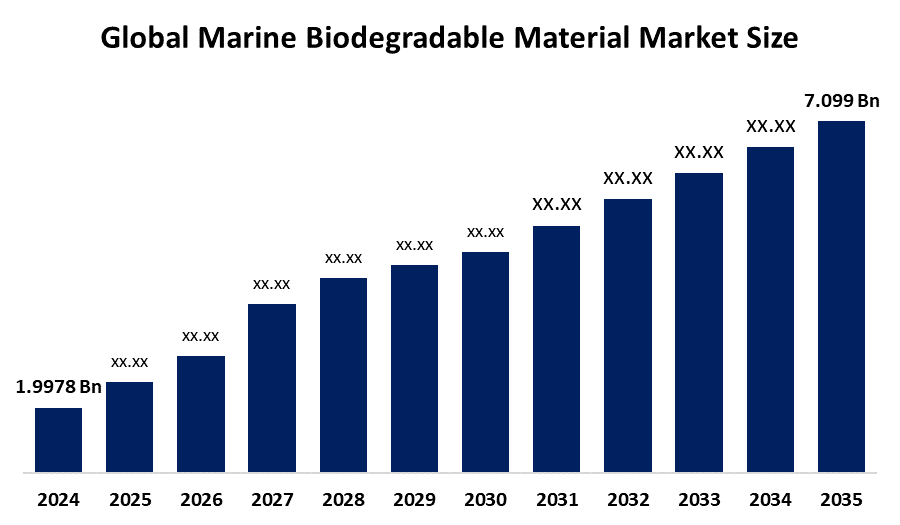
Top 50 Marine Biodegradable Material Leaders Worldwide 2025: Strategic Insights and Market Trends
RELEASE DATE: Aug 2025 Author: Spherical InsightsRequest Free Sample Speak to Analyst
Description
According To a research report published by Spherical Insights & Consulting, The Global Marine Biodegradable Material Market Size is Projected To Grow from USD 1.9978 Billion in 2024 to USD 7.099 Billion by 2035, at a CAGR of 12.24% during the forecast period 2025-2035. The market for Marine Biodegradable Material is growing demand due to increasing environmental awareness and regulations targeting plastic pollution.
Introduction
The global marine biodegradable materials include environmentally friendly materials in the market that naturally degrade in the maritime environment, which reduces plastic pollution and environmental effects. These materials, including biopolmers such as PHA, PLA, and Starch Blends, are used to promote packaging, fishing gear and disposable products to promote sea stability. Marine biodegradable materials have significant growth capacity in the market, inspired by increasing environmental awareness and stringent rules on plastic waste. One of the primary opportunities is the development of new and better biodegradable materials, with increased property with increased property and a rapid decline rate in marine environment. Companies are investing heavy in R&D to discover novel content that can change traditional plastic. For example, in January 2025, Panasonic Holdings Corporation (Panasonic HD) developed a molding material, which is completely domestic biodegradable that is incorporating highly concentrated plant-reputed cellulose fiber in resins. Panasonic HD was capable of creating a molding material with both excellent mechanical properties and marine biodegradable, which adds high concentrations of plant-type cellulose fibers to marine biodegradable resin.
Navigate Future Markets with Confidence: Insights from Spherical Insights LLP
The insights presented in this blog are derived from comprehensive market research conducted by Spherical Insights LLP, a trusted advisory partner to leading global enterprises. Backed by in-depth data analysis, expert forecasting, and industry-specific intelligence, our reports empower decision-makers to identify strategic growth opportunities in fast-evolving sectors. Clients seeking detailed market segmentation, competitive landscapes, regional outlooks, and future investment trends will find immense value in the full report. By leveraging our research, businesses can make informed decisions, gain a competitive edge, and stay ahead in the transition toward sustainable and profitable solutions.
Unlock exclusive market insights - Download The Brochure now and dive deeper into the future of the Marine Biodegradable Material Market.
Marine Biodegradable Material Market Size & Statistics
- The Market Size for Marine Biodegradable Material Was Estimated to be worth USD 1.9978 Billion in 2024.
- The Market Size is going to Expand at a CAGR of 12.24% between 2025 and 2035.
- The Global Marine Biodegradable Material Market Size is anticipated to reach USD 7.099 Billion by 2035.
- Europe is expected to generate the highest demand during the forecast period in the Marine Biodegradable Material Market
- Asia Pacific is expected to grow the fastest during the forecast period in the Marine Biodegradable Material Market.

Regional growth and demand
Asia Pacific is expected to grow the fastest during the forecast period in the Marine Biodegradable Material market. Rapid industrialization, rising population, and growing environmental awareness in countries such as China, India, and Japan are driving up demand for biodegradable materials. These countries' governments are putting in place regulations to reduce plastic waste and encourage the use of sustainable materials.
Europe is expected to generate the highest demand during the forecast period in the Marine Biodegradable Material market. This is due to strict environmental regulations, strong government support for sustainability, and widespread consumer awareness of plastic pollution. The European Union has implemented stringent policies, such as the Single-Use Plastics Directive, which prohibits certain non-biodegradable plastic products and encourages the use of environmentally friendly alternatives. Furthermore, Europe has a well-developed waste management infrastructure and a high adoption rate for biodegradable materials in industries such as packaging, agriculture, and fishing. Leading market players and research institutions in the region are constantly investing in the development of novel marine biodegradable materials, accelerating market growth. The presence of major biopolymer manufacturers, as well as increasing corporate commitments to sustainability, help Europe maintain its dominant market position.
Top 10 Trends in the Marine Biodegradable Material Market
- Increased Demand for Sustainable Packaging
- Regulatory Push
- Advancements in Biopolymer Blends
- Expansion into New Applications
- Regional Growth in Asia-Pacific
- Innovation in Material Formulation
- New Raw Materials
- Focus on PHA and PLA
- Composting Infrastructure Development
- Consumer Awareness and Education
1. Increased Demand for Sustainable Packaging
A significant driver is the growing awareness of ocean pollution and the subsequent push for eco-friendly alternatives, leading to a rise in demand for marine biodegradable materials in packaging.
2. Regulatory Push
Stringent regulations and bans on single-use plastics are accelerating the adoption of marine biodegradable materials in various regions.
3. Advancements in Biopolymer Blends
Innovations in blending PHA and PLA, enhancing durability and decomposition rates in marine environments, are gaining traction.
4. Expansion Regional Growth in Asia-Pacific
Beyond traditional packaging, marine biodegradable materials are finding applications in fisheries, shipping, and coastal tourism due to their eco-friendly disposal benefits.
5. Regional Growth in Asia-Pacific
The Asia-Pacific region is experiencing rapid growth in this market, fueled by government incentives and rising public awareness about ocean pollution.
Empower your strategic planning:
Stay informed with the latest industry insights and market trends to identify new opportunities and drive growth in the marine biodegradable material market. To explore more in-depth trends, insights, and forecasts, please refer to our detailed report.
Top 10 Companies Leading the Marine Biodegradable Material Market
- BASF
- NatureWorks
- Corbion
- Novamont
- Plantic Technologies Limited
- Mitsubishi Chemical Group
- Danimer Scientific
- Eastman Chemical Company
- Green Dot Bioplastics Inc.
- Mondi Group
- Others
1. BASF
Headquarters: Germany
BASF is actively involved in the marine biodegradable materials market, particularly with its ecoflex and ecovio products, which are biodegradable and certified compostable. They focus on developing and providing biopolymers that offer solutions for organic recycling and contribute to a circular economy. BASF's products are designed to be used in various applications, including packaging and food waste collection, and are certified for biodegradability in different environments, including agricultural soil.
2. NatureWorks
Headquarters: U.S.
NatureWorks is a key player in the marine biodegradable material market, primarily through its Ingeo biopolymer (PLA). Ingeo, made from renewable resources, is designed for various applications, including packaging and food serviceware, and is known for its compostability and biodegradability. NatureWorks is actively collaborating with other companies like CJ Bio to develop new biobased materials with enhanced properties and applications, including those suitable for marine environments.
3. Corbion
Headquarters: Netherlands
Corbion, through its joint venture TotalEnergies Corbion, is a key player in the marine biodegradable material market, specifically with Luminy PLA (Polylactic Acid). PLA is a biobased and biodegradable plastic that can be used as an alternative to traditional plastics, including in applications where marine biodegradability is a consideration. While PLA is not inherently marine biodegradable, Corbion is actively involved in projects and research to improve its biodegradability in marine environments and promote its use in applications like fishing nets.
4. Novamont
Headquarters: Italy
Novamont is a key player in the marine biodegradable materials market, particularly known for its Mater-Bi family of bioplastics. Mater-Bi is designed to biodegrade in marine environments, addressing concerns about plastic pollution in the oceans. Novamont's research and development efforts focus on creating sustainable solutions that integrate chemistry, environment, and agriculture to promote a circular bioeconomy.
5Plantic Technologies Limited
Headquarters: Australia
Plantic Technologies is a global bioplastics company that develops and markets biodegradable materials. They are a player in the marine biodegradable material market, offering alternatives to traditional plastics derived from renewable, non-genetically modified corn starch. Plantic's products are used in various applications, including packaging, and are known for their energy efficiency and reduced environmental impact compared to conventional plastics.
Are you ready to discover more about the marine biodegradable material market?
The report provides an in-depth analysis of the leading companies operating in the global marine biodegradable material market. It includes a comparative assessment based on their product portfolios, business overviews, geographical footprint, strategic initiatives, market segment share, and SWOT analysis. Each company is profiled using a standardized format that includes:
Company Profiles
- BASF
- Business Overview
- Company Snapshot
- Products Overview
- Company Market Share Analysis
- Company Coverage Portfolio
- Financial Analysis
- Recent Developments
- Merger and Acquisitions
- SWOT Analysis
- NatureWorks
- Corbion
- Novamont
- Plantic Technologies Limited
- Mitsubishi Chemical Group
- Danimer Scientific
- Eastman Chemical Company
- Green Dot Bioplastics Inc.
- Mondi Group
- Others
Conclusion
Based on the research report provided, the global maritime biodegradable material is ready for significant expansion. This growth is mainly inspired by the implementation of strict rules aimed at curbing enlarged environmental consciousness and plastic pollution. The market capacity lies in its ability to provide permanent options for traditional plastics, with applications spread from packaging to fishing gear. A major factor that pursues the market is a continuous innovation in the development of new biopolmeer and material mixtures that provide better properties and rapid decline rates in marine environment. Geographically, Europe is estimated to be the largest market due to its harsh environmental policies and strong consumer awareness. At the same time, the Asia-Pacific region is ready to experience the fastest development, the governments’ initiative to raise public awareness and promote permanent materials. The market is led by major companies and research institutes, which are actively investing in the development and commercialization of these environmentally friendly solutions, indicating a collective step towards a more durable and circular economy.
Need help to buy this report?